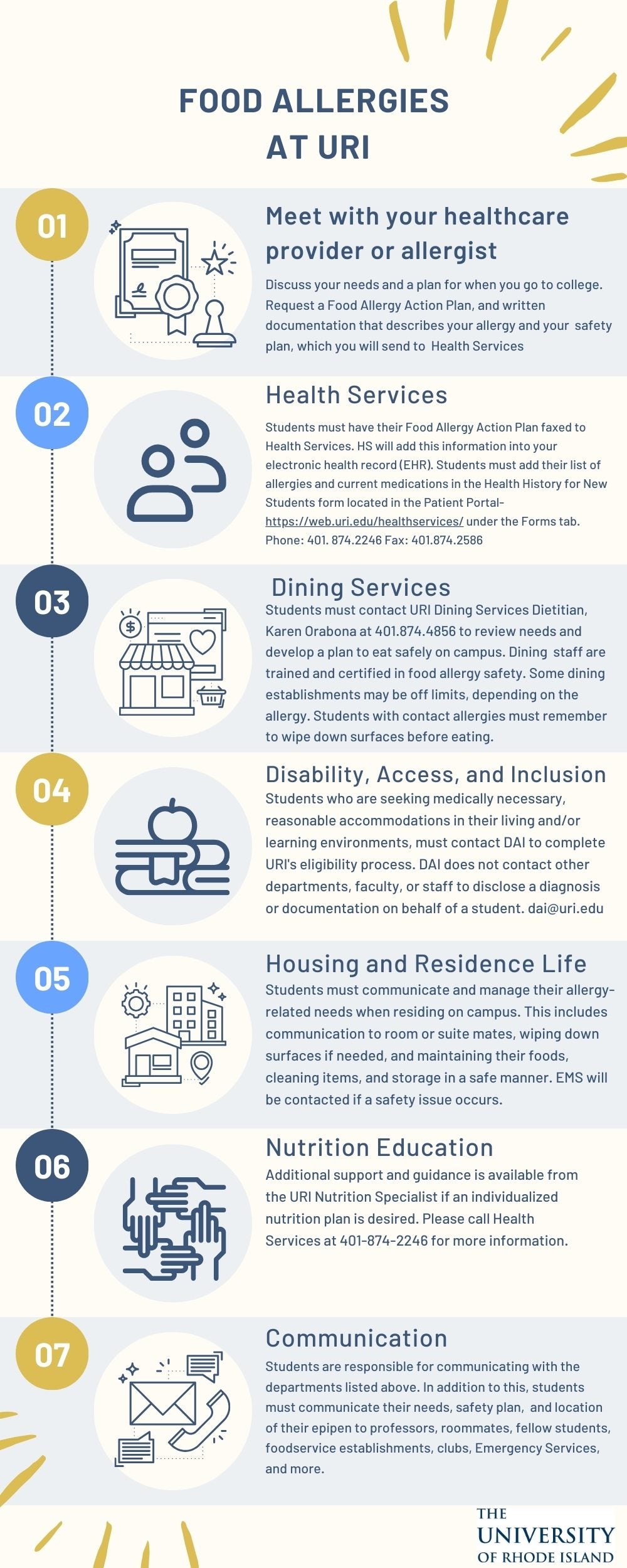Health Services, Dining Services, Housing and Residence Life, Emergency Services, and the office of Disability, Access, and Inclusion have partnered to create the infographic below to help our students to plan and communicate around their food allergy-based needs. Students are responsible for self-advocacy, proactive communication, and ensuring that they play an active leadership role in regard to managing their food allergy on campus.

Food Allergies at URI (screen reader-friendly version)
Meet with your healthcare provider or allergist
Discuss your needs and a plan for when you go to college. Request a Food Allergy Action Plan, and written documentation that describes your allergy and your safety plan, which you will send to Health Services.
Health Services
Students must have their Food Allergy Action Plan faxed to Health Services. HS will add this information into your electronic health record (EHR). Students must add their list of allergies and current medications in the Health History for New Students form located in the Patient Portal-Health Services under the Forms tab.
Phone: 401. 874.2246 Fax: 401.874.2586
Dining Services
Students must contact URI Dining Services Dietitian, Karen Orabona at 401.874.4856 to review needs and develop a plan to eat safely on campus. Dining staff are trained and certified in food allergy safety. Some dining establishments may be off limits, depending on the allergy. Students with contact allergies must remember to wipe down surfaces before eating.
Disability, Access, and Inclusion
Students who are seeking medically necessary, reasonable accommodations in their living and/or learning environments, must contact DAI to complete URI’s eligibility process. DAI does not contact other departments, faculty, or staff to disclose a diagnosis or documentation on behalf of a student. dai@uri.edu
Housing and Residence Life
Students must communicate and manage their allergy-related needs when residing on campus. This includes communication to room or suite mates, wiping down surfaces if needed, and maintaining their foods, cleaning items, and storage in a safe manner. EMS will be contacted if a safety issue occurs.
Nutrition Education
Additional support and guidance is available from the URI Nutrition Specialist if an individualized nutrition plan is desired. Please call Health Services at 401-874-2246 for more information.
Communication
Students are responsible for communicating with the departments listed above. In addition to this, students must communicate their needs, safety plan, and location of their epipen to professors, roommates, fellow students, foodservice establishments, clubs, Emergency Services, and more.
Remember to reach out to the members of clubs and organizations you join, and proactively contact event planners/organizers to learn about potential allergens. This is another areas where proactive self-advocacy can help you feel safer participating in all that URI has to offer!
Preparing for Life in College
Self-advocacy
Communicating your needs, safety plan, and location of your epipen are important to ensure your safety in a multitude of environments. Students cannot assume that allergy or safety information is communicated to others on their behalf. It is expected that an adult student will manage communication around their medical needs. College is a safe place to practice this important skill set!
Educating others
Most epi-pen kits come with test injectors to practice how to administer an epi-pen correctly. It’s always a great idea to make sure that your friends or others have a clear understanding of how and what to do when an emergency happens.
Emergency Expectations
In the event of a medical emergency, faculty, staff, and friends must call 911, especially since a secondary reaction can take place shortly after the initial one. While some students may prefer that an RA, professor, or other individual administer an epipen or not call 911, those individuals are not required to act on student preference.The student’s safety and wellbeing are most important, and emergency services are best equipped to respond and act.
Living on campus
Students with an allergy can connect with fellow students on social media or through orientation if they wish to room with another student who has the same allergy profile. Students living on campus must bring and keep separate their own food, dishes and dish cleaning supplies in order to avoid exposure. Students often choose to use a personal microwave to heat food
Contact and Airborne reactions
If your allergy includes a contact or airborne component, it is important for you to discuss and prepare for safety precautions. These will be determined by your medical team, and enacted by you. Precautions can range from wipes to pre-wipe down classroom or dining services, or masks to reduce exposure to airborne allergens.
Classroom Spaces
Faculty and staff are not responsible for maintaining an allergy free or reduced environment in traditional or nontraditional (Ex. the greenhouses or farm spaces) learning spaces. Learning spaces are used for a variety of purposes, and by different individuals throughout the day and evening.
Clubs and events
Remember to reach out to the members of clubs and organizations you join, and proactively contact event planners/organizers to learn about potential allergens. This is another areas where proactive self-advocacy can help you feel safer participating in all that URI has to offer!
